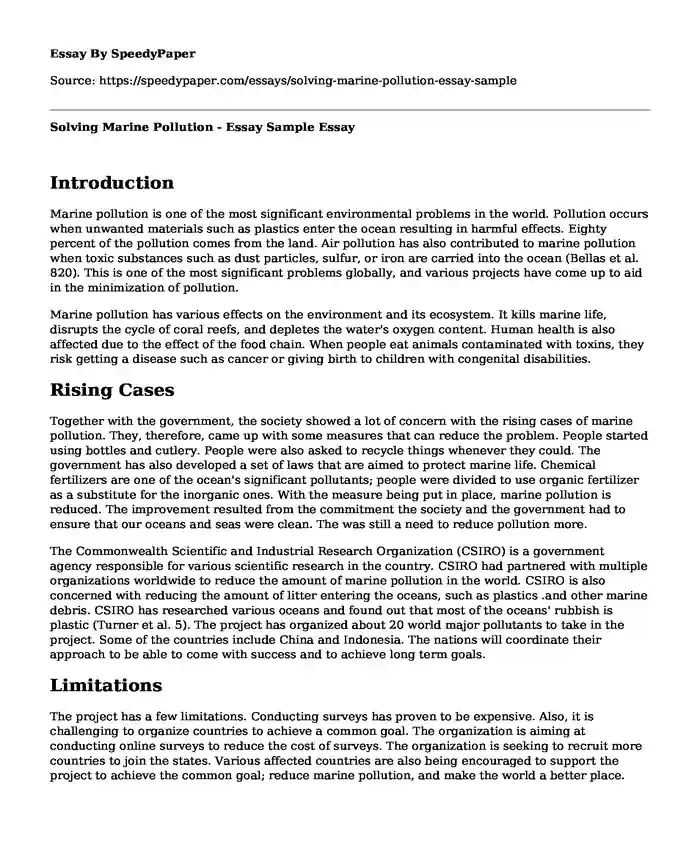Introduction
Marine pollution is one of the most significant environmental problems in the world. Pollution occurs when unwanted materials such as plastics enter the ocean resulting in harmful effects. Eighty percent of the pollution comes from the land. Air pollution has also contributed to marine pollution when toxic substances such as dust particles, sulfur, or iron are carried into the ocean (Bellas et al. 820). This is one of the most significant problems globally, and various projects have come up to aid in the minimization of pollution.
Marine pollution has various effects on the environment and its ecosystem. It kills marine life, disrupts the cycle of coral reefs, and depletes the water's oxygen content. Human health is also affected due to the effect of the food chain. When people eat animals contaminated with toxins, they risk getting a disease such as cancer or giving birth to children with congenital disabilities.
Rising Cases
Together with the government, the society showed a lot of concern with the rising cases of marine pollution. They, therefore, came up with some measures that can reduce the problem. People started using bottles and cutlery. People were also asked to recycle things whenever they could. The government has also developed a set of laws that are aimed to protect marine life. Chemical fertilizers are one of the ocean's significant pollutants; people were divided to use organic fertilizer as a substitute for the inorganic ones. With the measure being put in place, marine pollution is reduced. The improvement resulted from the commitment the society and the government had to ensure that our oceans and seas were clean. The was still a need to reduce pollution more.
The Commonwealth Scientific and Industrial Research Organization (CSIRO) is a government agency responsible for various scientific research in the country. CSIRO had partnered with multiple organizations worldwide to reduce the amount of marine pollution in the world. CSIRO is also concerned with reducing the amount of litter entering the oceans, such as plastics .and other marine debris. CSIRO has researched various oceans and found out that most of the oceans' rubbish is plastic (Turner et al. 5). The project has organized about 20 world major pollutants to take in the project. Some of the countries include China and Indonesia. The nations will coordinate their approach to be able to come with success and to achieve long term goals.
Limitations
The project has a few limitations. Conducting surveys has proven to be expensive. Also, it is challenging to organize countries to achieve a common goal. The organization is aiming at conducting online surveys to reduce the cost of surveys. The organization is seeking to recruit more countries to join the states. Various affected countries are also being encouraged to support the project to achieve the common goal; reduce marine pollution, and make the world a better place.
The organization was so thoughtful about developing the project. Countries, especially the ones with beaches, should join the project. Young people should learn from it and endorse such a project since they are the future leaders. The project is ethical since it supports the social construction of nature. With the reduction of debris in the oceans, the environment will be cleaner, and there will be a reduction of harmful effects on the ecosystem. It has only contributed to the stabilization of the economy; when our oceans are clean, people can derive maximum economic benefits.
Conclusion
Marine pollution is one of the most significant environmental problems in the world. It occurs when harmful substances are carried into the oceans. It is estimated that 100 million animals die each year from marine pollution. The substances are called debris. Plastics are the main debris that has created an ecological concern. Waste is highly concentrated in significant cities (Thanuskodi 8). About 80 percent of marine pollutant comes from land. The solution to the problem is for the society to join hands with the government and clean up our oceans. People should also be encouraged to use reusable cutlery other than the plastic ones. The solution would reduce the rate of marine pollution.
Works Cited
Belles, J. et al. "New Challenges in Marine Pollution Monitoring." Frontiers in Marine Science 6 (2020): 820.
Turner, Andrew, et al. "Marine pollution from pyroclastics." Science of the Total Environment 694 (2019): 133610.
Thanuskodi, S. "Marine Pollution Bulletin: A Scientometric Analysis." Marine Pollution Bulletin (2018). SAWJ.
Cite this page
Solving Marine Pollution - Essay Sample. (2023, Dec 25). Retrieved from https://speedypaper.com/essays/solving-marine-pollution-essay-sample
Request Removal
If you are the original author of this essay and no longer wish to have it published on the SpeedyPaper website, please click below to request its removal:
- Global Warming Topic Essay Example
- Acid Rain and Plant Growth - Free Essay on Air Pollution
- Bonobos vs. Common Chimps, Essay Example on Animals
- Free Essay Sample about California Wildfires 2007
- Free Essay Example - Geographical area
- Essay Example: The Positive and Negative Impacts of Solar Power As a Renewable Energy Source
- Essay Sample on Corporate Social Responsibility and Privacy
Popular categories





